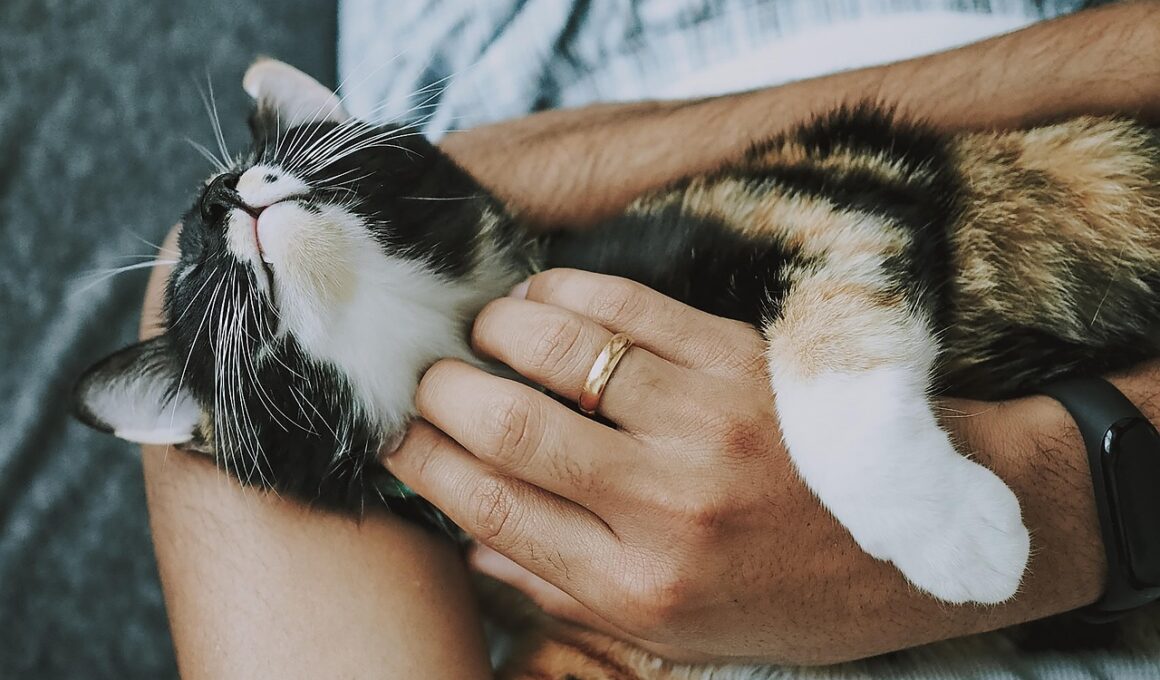Dealing with Gingivitis in Kittens
Gingivitis is a common dental issue in kittens that can lead to serious concerns if not addressed early. As a kitten owner, it is crucial to be aware of the signs of gingivitis, such as swollen gums, bad breath, and difficulty eating. Regular dental check-ups with your veterinarian can help identify potential problems before they escalate. Good dental hygiene can significantly improve your kitten’s overall health and well-being, ensuring a happy and active life. Early intervention is key when managing dental issues in kittens. Implementing a proper dental care routine can vastly reduce the risks associated with gingivitis. This practice includes regular brushing of your kitten’s teeth to eliminate plaque buildup, which promotes gum health. Choosing the right toothpaste specifically designed for kittens is essential, as human toothpaste may be harmful to pets. Additionally, incorporating dental treats into their diet can also assist in maintaining oral health. Make these practices fun activities that strengthen the bond between you and your kitten. By understanding the importance of dental care, you can prevent gingivitis and provide your kitten with the care they deserve. Visit your vet regularly for guidance on effective dental care.
Signs of Gingivitis to Recognize
Identifying gingivitis in kittens is integral to ensuring their oral health. Several symptoms can indicate the onset of gingivitis, including, but not limited to, unusual behaviors during eating, excessive drooling, and redness around the gums. Upon noticing these warning signs, it is imperative to consult a veterinarian promptly for a thorough examination. Early diagnosis can ensure their dental health remains intact. Observational habits are essential in recognizing gingivitis, as practitioners often recommend vigilance in monitoring your kitten’s eating habits and oral hygiene. If your kitten continues to show signs of discomfort while trying to eat, or if their breath emits a foul odor, these could be telltale symptoms of gingivitis. Furthermore, changes in their personality, such as increased irritation or lethargy, may also signal developing dental issues. Regularly inspecting your kitten’s mouth, although challenging, can also help you detect early signs of gingivitis. If you notice anything unusual, do not hesitate to reach out for professional help. Prioritizing quick action can prevent more serious complications from arising and maintain your kitten’s happiness.
Prevention Strategies for Dental Health
Preventing gingivitis in kittens can save you from unnecessary stress and costs related to dental complications. Establishing a proactive dental care routine is vital for your kitten’s overall health. Begin by introducing your kitten to regular tooth brushing at an early age; this acclimatizes them to the experience and ensures that it becomes part of their routine. Gently brushing their teeth using kitten-friendly toothpaste promotes healthy gums and prevents plaque accumulation. Additionally, consider incorporating specific dental treats or toys designed to support oral health. These products can aid in cleaning your kitten’s teeth and reducing the buildup of tartar and plaque while they chew. Regular dental check-ups with your veterinarian should also be scheduled to address any arising issues promptly. Establish a healthy diet rich in essential vitamins and minerals, encouraging good oral hygiene practices. Just as with humans, hydration plays a crucial role in maintaining oral health, so always provide clean, fresh water daily. In combination, these strategies can significantly contribute to preventing gingivitis and promoting longevity in your kitten’s life.
It is always best to educate yourself on possible dental treatments should gingivitis occur. If your veterinarian diagnoses your kitten with gingivitis, they may recommend a professional dental cleaning as part of the treatment plan. During this procedure, plaque and tartar are removed by professionals, often requiring anesthesia to ensure your kitten remains calm and comfortable. Post-procedure, follow-up care is equally important to ensure your kitten heals properly. Your vet may provide specific guidance on at-home care following their visit. Attention to your kitten’s diet and ensuring they avoid soft, sticky foods during recovery is crucial. Sticking to vet recommendations will help foster healing and restore their oral health. Monitor their recovery process, watching for any resurgence of symptoms that may indicate further issues. Over time, you will be able to better understand what level of care suits your kitten’s unique needs. As a devoted pet owner, prevent gingivitis from becoming a chronic issue by instituting regular monitoring and care routines. Be informed and proactive to maintain a happy, healthy life for your beloved companion.
When to Consult a Veterinarian
Knowing when to contact your veterinarian is critical in managing your kitten’s oral health effectively. If you observe any symptoms related to gingivitis or have concerns regarding your kitten’s dental health, do not hesitate to seek professional advice. Timely interventions often lead to better outcomes and decrease the risk of severe complications. Routine veterinary check-ups should be part of your kitten’s healthcare plan; this proactive approach decreases the likelihood of serious dental problems. Vets typically recommend visits every six months for young animals, but this may vary. While dental cleanings are crucial prevention strategies, your vet is also equipped to offer recommendations tailored to your kitten’s particular situation. Be attentive to changes in appetite and behavior, as these can be indicators of oral discomfort. Never ignore persistent bad breath, which often signals underlying health issues that require medical attention. Ultimately, regular consultations with a veterinarian foster a strong foundation for your kitten’s health, and will keep you informed about the latest preventive measures.
Long-term Oral Care for Kittens
Long-term oral care for kittens involves creating a tailored routine that continuously supports their dental health throughout their lives. After establishing effective preventive measures, engage in regular dental check-ups that adapt over their lifespan. As they transition from kittens to adults, their dietary needs and oral requirements may evolve, necessitating various adjustments in care regimes. Educate yourself on kitten-specific dental issues, as ongoing learning about their health needs ensures informed decisions. Incorporating daily tooth brushing into your routine can yield significant benefits, reinforcing a positive experience for your kitten. If possible, make oral hygiene a joyful activity that deepens your bond while supporting their overall health. Furthermore, consider discussing your kitten’s dental care with your veterinarian, as they can provide useful insights and recommendations on the best dental hygiene products suitable for your pet. Maintaining regular check-ups, actively participating in their dental care, and keeping open lines of communication with your veterinarian are crucial elements in long-term oral health. A lifetime of good dental hygiene practices will not only enhance the quality of life for your kitten but can also prevent further complications or discomfort.
In conclusion, carrying out effective dental care practices is vital for managing gingivitis and overall oral health in kittens. Familiarizing yourself with the signs of gingivitis helps create an environment where timely interventions can occur, promoting well-being. Implementing preventive strategies, such as regular brushing and using dental treats, significantly lowers the risk of developing dental issues. Routine vet check-ups and strong communication with your veterinarian are paramount in safeguarding your pet’s health. Likewise, fostering a long-term oral hygiene routine ensures your beloved companion maintains good dental health well into adulthood. Recognizing symptoms and being proactive about your kitten’s dental health can make a huge difference in their quality of life. Creating a safe and comfortable experience around oral hygiene practices ensures that your kitten will be more receptive to regular dental care. With dedication and attention to detail, you can provide a happy and healthy life for your kitten, free from the constraints of gingivitis. By prioritizing dental care, you not only invest in their current health but also set them on a path toward a vibrant and joyful life.
Dealing with Gingivitis in Kittens
Gingivitis is a common dental issue in kittens that can lead to serious concerns if not addressed early. As a kitten owner, it is crucial to be aware of the signs of gingivitis, such as swollen gums, bad breath, and difficulty eating. Regular dental check-ups with your veterinarian can help identify potential problems before they escalate. Good dental hygiene can significantly improve your kitten’s overall health and well-being, ensuring a happy and active life. Early intervention is key when managing dental issues in kittens. Implementing a proper dental care routine can vastly reduce the risks associated with gingivitis. This practice includes regular brushing of your kitten’s teeth to eliminate plaque buildup, which promotes gum health. Choosing the right toothpaste specifically designed for kittens is essential, as human toothpaste may be harmful to pets. Additionally, incorporating dental treats into their diet can also assist in maintaining oral health. Make these practices fun activities that strengthen the bond between you and your kitten. By understanding the importance of dental care, you can prevent gingivitis and provide your kitten with the care they deserve. Visit your vet regularly for guidance on effective dental care.


